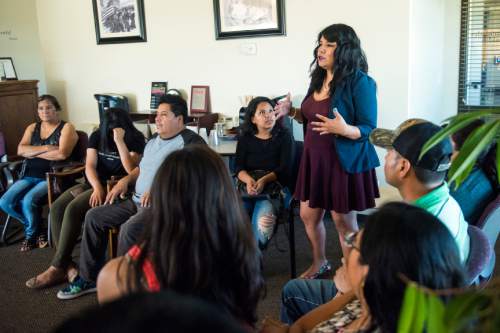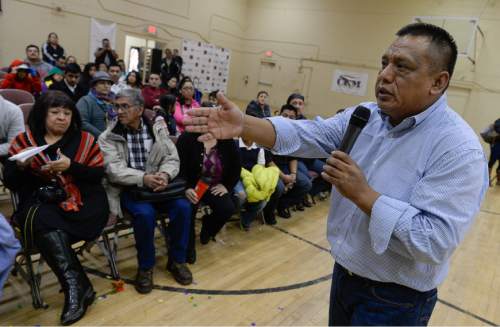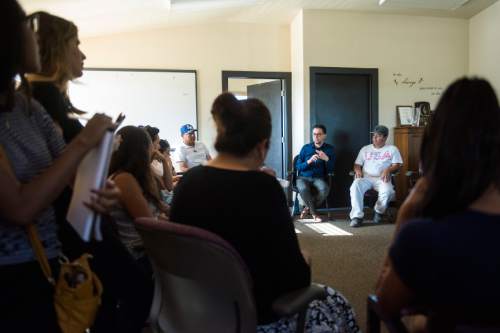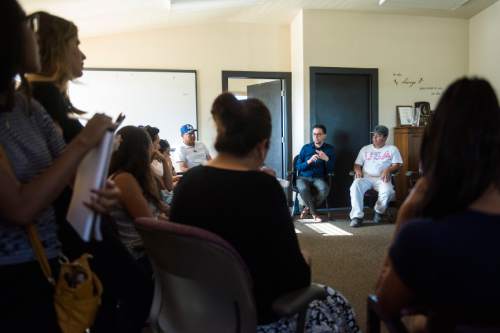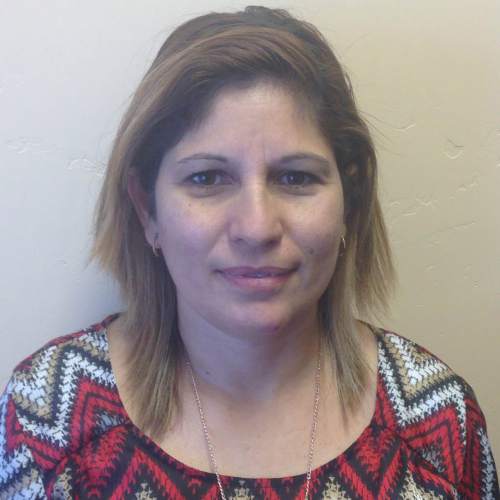This is an archived article that was published on sltrib.com in 2016, and information in the article may be outdated. It is provided only for personal research purposes and may not be reprinted.
Blanca Leyva remembers her elation two years ago when President Barack Obama proposed to shield millions of undocumented immigrants like her from deportation.
"We had hope. We were going to have a better life. We no longer needed to worry. We were happy," the West Valley City resident said in Spanish. She and her husband left Mexico, seeking a better life for their children, and that future seemed sure and bright.
But now it's murky and shaky again after a 4-4 U.S. Supreme Court ruling Thursday let stand a lower court order that blocks Obama's orders.
"I'm a little sad. I worry whether we will be able to stay here," she said. "We thought we would find better jobs," but that seems to have gone up in smoke. "I'm angry, too," as their world has turned upside down again.
Utah Latino leaders say Leyva's reactions are typical of what they are hearing. They also say furious Latinos are vowing to vote Democratic to help ensure that they have a president who will seek to implement Obama's orders, and who will appoint a Supreme Court justice to uphold the effort.
"Everybody is disappointed. There's just sadness in the community," said Tony Yapias, director of Proyecto Latino de Utah. "Hopes were high that something positive would come from this, but that didn't happen."
Obama had proposed that parents of children who are U.S. citizens or legal residents — Leyva has an 8-year-old daughter who was born here, for example — be able to pay fees and apply to remain in the country legally for at least three years, and obtain permission to work legally.
"If it had gone through, it would have been easier for a lot of these families to get a better paying job or go back to school," Yapias said. "You can't imagine how much this hurts."
"A lot of people are angry right now," said Mayra Cedano, community engagement program manager for Comunidades Unidas. And she said they are channeling that anger into plans for more participation in voting.
"A lot of families here in Utah live in what we call mixed-data families. So many of us are U.S. citizens, but our cousins, our uncles might be undocumented," and the pain they feel will carry to the polls, she said.
"All the texts I've been getting all day are about how we need to get more people to register to vote," she said.
Comunidades Unidas issued a news release saying, "Politicians need to realize that this is not just a policy issue, this is a personal issue. … Come November, we will remember who stood with us, and who stood against us, as we cast our very powerful votes."
"This is going to infuriate Latinos to come and vote," Yapias said. He adds that many pundits figure Donald Trump needs 30 percent to 40 percent of the Latino vote to win, but he has spoken out against Obama's immigration orders and has promised mass deportations of illegal immigrants.
So Yapias predicts, "Up to 90 percent of Latinos will vote Democratic. This is bad news for Republicans."
And not just Trump. Yapias said it could make a difference in other races, such as a tight U.S. House race between Rep. Mia Love and Democrat Doug Owens. "I think Mia Love is in danger now because of this," Yapias said.
Census estimates released this week say that 411,143 Latinos now live in Utah, 13.7 percent of the population. That is one of every seven Utahns.
Various studies have estimated that between 88,000 and 100,000 undocumented immigrants live in Utah. Most, but not all, are Latino. Cedano notes, for example, that many are Asian, and some come from other ethnic groups.
A 2014 study by the Migration Policy Institute estimated that 55 percent of the undocumented population in Utah could be shielded from deportation under Obama's orders — the highest such percentage in any state.
That may be because Utah suffered less in the recession than most states, so more undocumented immigrants may have remained here instead of returning to their home countries.
While the Utah Latino community generally is sad about the Supreme Court ruling, Utah Attorney General Sean Reyes is celebrating. Utah is among the states that had challenged Obama's immigration orders.
"Utah joined this lawsuit because regardless of how you feel about the president's policy, it does not justify implementation in an unconstitutional manner," Reyes said. "In this case, as in so many others, the president overstepped his authority in making law without congressional participation."
Reyes added, "While serious deficiencies exist in current immigration policy, solutions should come through Congress, not by executive branch fiat. If Congress is ignored, any extension of benefits or rights is tenuous and subject to being withdrawn as arbitrarily as they were given. The Latino community and all Americans deserve better."


